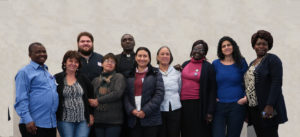On the sixth day of creation, God, the Creator, ”looked over everything he had made; it was so good, so very good!” Gen. 1:31 (from The Message)
Such a message of hope for us in these days of fake news, the violence of wars, natural disasters, racism, verbal abuse at so many levels and even genocide: goodness is inherent in all of creation. It is in our DNA, and it is now that we as a species are called to live that reality of being a force for goodness in this world.
 In my personal experience of facilitating and co-ordinating Kairos Blanket Exercises, I, with the facilitators and participants have the privilege of seeing how truth, when revealed and received by Indigenous and non-Indigenous people, is freeing. For the Indigenous peoples, their story is told: of the impact of residential schools, of being given Hudson Bay blankets as “gifts” that were full of the small pox virus, of the seizure of lands that were sources of food, of the murdered and missing indigenous women and children…boys and girls, of the Indian Act that reduced whole nations to being put on small isolated reserves and forbidden to practice their spirituality or cultural practices, and who were “assimilated” into the white society to be made “civilized”, as the settlers defined the meaning of the term of being “civilized”. The non-Indigenous participants hear this same story as told by an Indigenous and a non-Indigenous facilitator. If the participants come with an open mind, heart and will, they are INformed, TRANSformed, and empowered to work together to seek ways of “Returning to Harmony” (see Richard Wagamese’s article: https://teacherlauragroome.files.wordpress.com/2018/01/returning-to-harmony.pdf
In my personal experience of facilitating and co-ordinating Kairos Blanket Exercises, I, with the facilitators and participants have the privilege of seeing how truth, when revealed and received by Indigenous and non-Indigenous people, is freeing. For the Indigenous peoples, their story is told: of the impact of residential schools, of being given Hudson Bay blankets as “gifts” that were full of the small pox virus, of the seizure of lands that were sources of food, of the murdered and missing indigenous women and children…boys and girls, of the Indian Act that reduced whole nations to being put on small isolated reserves and forbidden to practice their spirituality or cultural practices, and who were “assimilated” into the white society to be made “civilized”, as the settlers defined the meaning of the term of being “civilized”. The non-Indigenous participants hear this same story as told by an Indigenous and a non-Indigenous facilitator. If the participants come with an open mind, heart and will, they are INformed, TRANSformed, and empowered to work together to seek ways of “Returning to Harmony” (see Richard Wagamese’s article: https://teacherlauragroome.files.wordpress.com/2018/01/returning-to-harmony.pdf
 For ALL participants, the telling and hearing of this story together is the beginning education of the truth of Canadian history: painful to tell and to hear but nonetheless a vehicle for further dialogue, leading to sowing initial seeds for reconciliation, or restoring a relation of collaboration that once existed. See Murray Sinclair speak about reconciliation in this 4-minute video https://www.csps-efpc.gc.ca/video/ssontr-eng.aspx
For ALL participants, the telling and hearing of this story together is the beginning education of the truth of Canadian history: painful to tell and to hear but nonetheless a vehicle for further dialogue, leading to sowing initial seeds for reconciliation, or restoring a relation of collaboration that once existed. See Murray Sinclair speak about reconciliation in this 4-minute video https://www.csps-efpc.gc.ca/video/ssontr-eng.aspx
Senator Murray Sinclair, the head of the Truth and Reconciliation Commission that was issued in 2015, quotes:"It is education that got into this and it is education that will get us out of it.”
Being a retired teacher and educator, I am convinced that education is a beginning to living in right relationship, if we work together toward this. We are ALL inherently GOOD: we can choose to live out of that belief in all our interactions.
Submitted by Kathleen Lichti, CSJ






